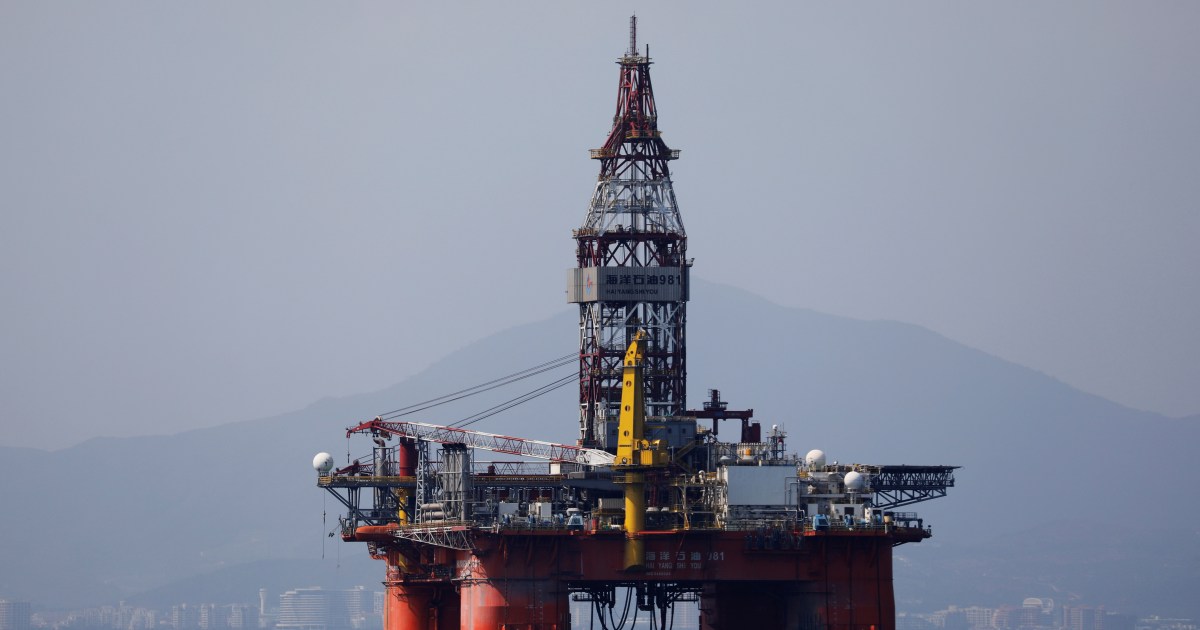In his latest criticism of China, Trump hits officials and companies by banning the United States | Energy News

In its final days, US President Donald Trump’s administration has taken further strikes on China and its largest corporation, imposing sanctions on officials and companies for alleged crimes in the South China Sea and placing an investment ban on nine other companies.
These moves will increase tensions with China, Washington’s strategic rival in Asia, days before President-elect Joe Biden takes office on Wednesday. The Biden transition team did not immediately respond to a request for comment.
State-owned company executives, Chinese Communist Party officials and the military, along with the China National Offshore Oil Company (CNOOC), will face new restrictions for allegedly using coercion against countries with rival claims in the South China Sea.
Senior US officials told reporters in a call on Thursday that the new restrictions imposed on CNOOC – the country’s main deepwater explorer – will not apply to crude oil, refined fuels and liquid natural gas, nor do they apply to existing joint ventures with CNOOC that are not operating at. South China Sea.
Investment ban
Nine Chinese companies have been added to the Pentagon’s list of companies with alleged ties to the Chinese military, including aircraft manufacturer Comac and Xiaomi Corp.
These companies will be subject to a new US investment ban that will force US investors to liquidate the holdings of the blacklisted companies by November 11, 2021.
In its response, the Chinese embassy referred to comments by the Foreign Ministry on January 7 accusing Washington of “fixing political and ideological marks on economic and commercial issues and exploiting the state’s power to suppress foreign companies, under the pretext of national security.”
The United States has long opposed China’s extensive territorial claims in the South China Sea, a potentially resource-rich region that is also a strategic trade route. Washington accuses Beijing of intimidating countries like Vietnam and the Philippines, which have conflicting claims there.
China accuses Washington of trying to destabilize the region by sending warships and aircraft to the South China Sea.
In announcing the sanctions, Secretary of State Mike Pompeo said: “The United States stands with the claimant states in Southeast Asia that seek to defend their sovereign rights and interests, in accordance with international law.”
Pompeo said Washington is imposing visa restrictions on CEOs of Chinese state-owned companies and Chinese Communist Party and Navy officials.
He said the sanctions were directed against those “responsible for, or complicit in, either large-scale reclamation, construction or militarization of disputed outposts in the South China Sea, or the use of coercion against claimants in Southeast Asia to prevent their access to outside sources.”
He said the restrictions could also apply to immediate family members.
The Commerce Department accused CNOOC of harassing and threatening offshore oil and gas exploration and extraction in the South China Sea, “with the aim of increasing political risks for interested foreign partners, including Vietnam.”
The Trump administration continued the pressure in its final days, targeting what Washington sees as Beijing’s attempt to use companies as a way to harness civilian technologies for military purposes.
Malicious items
Commerce Minister Wilbur Ross said that CNOOC acted as a “People’s Liberation Army bully to intimidate China’s neighbors” and that the Chinese military “continues to benefit from the government’s civilian-military fusion policies for malicious purposes.”
 China Commercial Aircraft Corporation (COMAC) is the manufacturer of the first domestically built narrow-body jet with a capacity of 158 seats, which aims to compete with similar models of the Airbus Group and Boeing Co. [File: China Daily via Reuters]
China Commercial Aircraft Corporation (COMAC) is the manufacturer of the first domestically built narrow-body jet with a capacity of 158 seats, which aims to compete with similar models of the Airbus Group and Boeing Co. [File: China Daily via Reuters]
Ross’s division added CNOOC to the “Entity List” that requires companies to be granted special licensing before they can receive exports of high-tech items from US suppliers.
The Chinese airline Skyrizon has been added to the military end user (MEU) list due to its ability to develop military products including aircraft engines, which restricts its access to US exports.
Apart from Comac and Xiaomi, the Pentagon added Advanced Micro-Fabrication Equipment Inc., Luokung Technology Corp., Beijing Zhongguancun Development Investment Center, GOWIN Semiconductor Corp., Grand China Air Co Ltd, Global Tone Communication Technology Co Ltd, China National Aviation Holding Co Ltd. To the list.
Chinese company representatives did not immediately respond to requests for comment.
Four people familiar with the matter said the Trump administration on Wednesday canceled plans to blacklist Chinese tech giants Alibaba, Tencent and Baidu.
Xiaomi’s shares fell as much as 12 percent in Hong Kong, while its suppliers also declined.
CNOOC-listed unit CNOOC Ltd fell 2 per cent before rising 1.7 per cent.

“Coffee fanatic. Gamer. Award-winning zombie lover. Student. Hardcore internet advocate. Twitter guru. Subtly charming bacon nerd. Thinker.”











